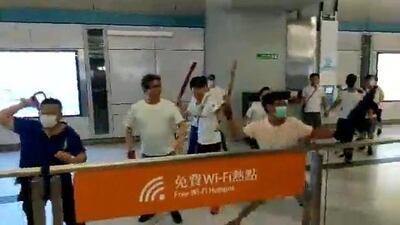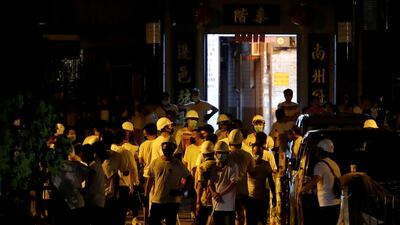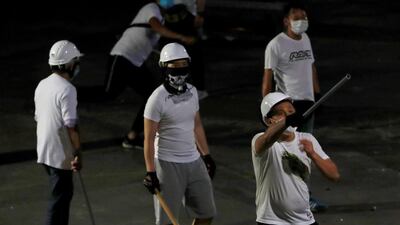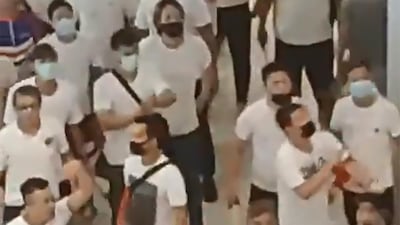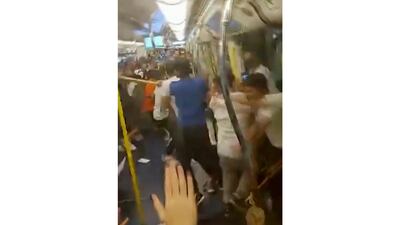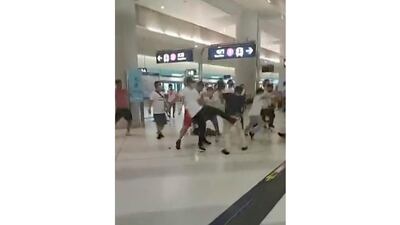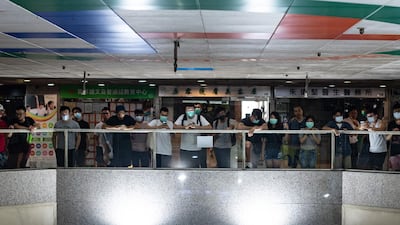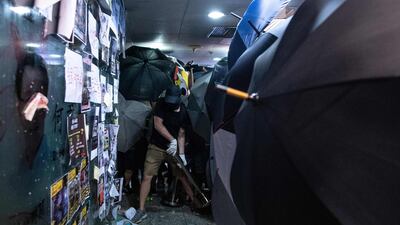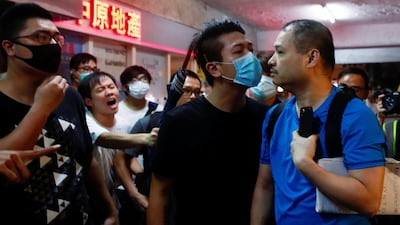Hong Kong's leader has promised an investigation after suspected triad gangsters on train passengers on Sunday, after a night of bloody attacks opened new fronts in the political crisis now deepening across the city. Some fear the escalating violence could prompt an intervention by China’s People’s Liberation Army.
Screams rang out in the rural Yuen Long station on Sunday as men clad in white T shirts and armed with poles stormed a train, attacking passengers, according to footage taken by commuters and Democratic Party lawmaker Lam Cheuk-ting.
Some passengers had been at an earlier anti-government march and the attack came after several thousand activists surrounded China's representative office in the city, later clashing with police.
Mr Lam, who was injured in the attack, said he was angry about a slow police response after he alerted them to the trouble, government-funded broadcaster RTHK reported.
Mr Lam said the police action had failed to protect the public, allowing the triads to run rampant.
"Is Hong Kong now allowing triads to do what they want, beating up people on the street with weapons?" he asked reporters.
Pro-democracy lawmaker Claudia Mo said there was “more than apparent” involvement from the triad, a branch of organised crime in Hong Kong.
“What happened last night doesn’t seem accidental in any way,” Ms Mo said. “It’s all organised.”
Hong Kong’s leader Carrie Lam described the train station attack as "shocking" but said allegations that police colluded with the assailants were “unfounded”, adding that authorities would investigate fully.
She also strongly condemned some anti-government protesters for an "attack" on China's main representative office in the city.
Earlier on Sunday, police fired rubber bullets and tear gas to disperse activists after they had fled China's Liaison Office, its main representative branch in the city, after defacing some walls and a national emblem.
The action came after more than 100,000 people marched through the city to demand democracy and an investigation into the use of force by police to disperse crowds at earlier protests.
Ms Lam said the targeting of the office was a "challenge" to national sovereignty, condemning violent behaviour of any kind. She said throwing eggs and black paint on the emblem “hurt the nation’s feelings.”
The Chinese government has condemned the action, with the country’s Foreign Ministry saying on Monday that the behaviour of some "radical" Hong Kong protesters violates the bottom line of the "One Country, Two Systems" formula through which Beijing administers the territory.
The official People's Daily newspaper said on Monday in a front-page commentary that the protesters' actions were "intolerable."
The article headlined “Central Authority Cannot be Challenged” expanded on a strong condemnation issued the previous night by the government’s Hong Kong and Macao Affairs Office.
The growing tumult has fuelled fears that China’s People’s Liberation Army may intervene.
A Chinese army brigade said on Monday that it held an anti-terrorism exercise in southern Guangdong province. The 74th Army Group did not refer to Hong Kong in its social media statement, but military commentator and retired officer Yue Gang said that troops would be dispatched to the semi-autonomous territory if needed.
“To deface the Chinese national emblem is like acting as an enemy to 1.3 billion Chinese people,” Mr Yue said. “They must be deterred.”
Hu Xijin, editor-in-chief of the nationalistic Global Times, warned against military intervention.
“If the People’s Liberation Army helps to stabilise the situation, Hong Kong will benefit from law and order, but the public opinion won’t buy it,” Mr Hu wrote in a commentary published on Weibo, a popular Chinese microblogging service. The public will “accuse Beijing of undermining ‘one country, two systems,’” he said.
The “one country, two systems” framework allows Hong Kong a fair degree of autonomy in local affairs.
But two months of sometimes violent protests has produced the most serious crisis since Britain handed the freewheeling city back to Chinese rule in 1997.
Protesters are demanding the full withdrawal of a bill to allow people to be extradited to mainland China for trial, where the courts are controlled by the Communist Party, and independent inquiries into the use of police force against protesters.
The continuing unrest also marks the greatest popular challenge to Chinese leader Xi Jinping since he came to power in 2012.
The Hospital Authority said 45 people were injured in the Yuen Long attack, with one in a critical condition. Some 13 people were injured after the clashes on Hong Kong island, one seriously, the authority said.
In a statement early on Monday, police "strongly condemned" both violent incidents and were investigating both cases.
Some police had been injured in the clashes after protesters hurled bricks, smoke grenades and petrol bombs, the statement said.
Company%20profile%20
%3Cp%3E%3Cstrong%3EName%3A%20%3C%2Fstrong%3EElggo%3Cbr%3E%3Cstrong%3EStarted%3A%3C%2Fstrong%3E%20August%202022%3Cbr%3E%3Cstrong%3EFounders%3A%3C%2Fstrong%3E%20Luma%20Makari%20and%20Mirna%20Mneimneh%3Cbr%3E%3Cstrong%3EBased%3A%3C%2Fstrong%3E%20Dubai%2C%20UAE%3Cbr%3E%3Cstrong%3ESector%3A%3C%2Fstrong%3E%20Education%20technology%20%2F%20health%20technology%3Cbr%3E%3Cstrong%3ESize%3A%3C%2Fstrong%3E%20Four%20employees%3Cbr%3E%3Cstrong%3EInvestment%20stage%3A%3C%2Fstrong%3E%20Pre-seed%3C%2Fp%3E%0A
UAE currency: the story behind the money in your pockets
TV: World Cup Qualifier 2018 matches will be aired on on OSN Sports HD Cricket channel
Engine: 80 kWh four-wheel-drive
Transmission: eight-speed automatic
Power: 402bhp
Torque: 760Nm
Price: From Dh280,000
Fighter profiles
Gabrieli Pessanha (Brazil)
Reigning Abu Dhabi World Pro champion in the 95kg division, virtually unbeatable in her weight class. Known for her pressure game but also dangerous with her back on the mat.
Nathiely de Jesus, 23, (Brazil)
Two-time World Pro champion renowned for her aggressive game. She is tall and most feared by her opponents for both her triangles and arm-bar attacks.
Thamara Ferreira, 24, (Brazil)
Since her brown belt days, Ferreira has been dominating the 70kg, in both the World Pro and the Grand Slams. With a very aggressive game.
Samantha Cook, 32, (Britain)
One of the biggest talents coming out of Europe in recent times. She is known for a highly technical game and bringing her A game to the table as always.
Kendall Reusing, 22, (USA)
Another young gun ready to explode in the big leagues. The Californian resident is a powerhouse in the -95kg division. Her duels with Pessanha have been highlights in the Grand Slams.
Martina Gramenius, 32, (Sweden)
Already a two-time Grand Slam champion in the current season. Gramenius won golds in the 70kg, in both in Moscow and Tokyo, to earn a spot in the inaugural Queen of Mats.
The specs
Engine: 3.9-litre twin-turbo V8
Power: 620hp from 5,750-7,500rpm
Torque: 760Nm from 3,000-5,750rpm
Transmission: Eight-speed dual-clutch auto
On sale: Now
Price: From Dh1.05 million ($286,000)
SPECS
%3Cp%3EEngine%3A%20Twin-turbocharged%204-litre%20V8%3Cbr%3EPower%3A%20625%20bhp%3Cbr%3ETorque%3A%20630Nm%3Cbr%3EOn%20sale%3A%20Now%3Cbr%3EPrice%3A%20From%20Dh974%2C011%3C%2Fp%3E%0A
The%20specs
%3Cp%3E%3Cstrong%3EEngine%3A%20%3C%2Fstrong%3E2.0-litre%204-cyl%20turbo%3Cbr%3E%3Cstrong%3EPower%3A%20%3C%2Fstrong%3E190hp%20at%205%2C600rpm%3Cbr%3E%3Cstrong%3ETorque%3A%20%3C%2Fstrong%3E320Nm%20at%201%2C500-4%2C000rpm%3Cbr%3E%3Cstrong%3ETransmission%3A%20%3C%2Fstrong%3E7-speed%20dual-clutch%20auto%3Cbr%3E%3Cstrong%3EFuel%20consumption%3A%20%3C%2Fstrong%3E10.9L%2F100km%3Cbr%3E%3Cstrong%3EPrice%3A%20%3C%2Fstrong%3EFrom%20Dh119%2C900%3Cbr%3E%3Cstrong%3EOn%20sale%3A%20%3C%2Fstrong%3ENow%3C%2Fp%3E%0A
Specs
Engine: Dual-motor all-wheel-drive electric
Range: Up to 610km
Power: 905hp
Torque: 985Nm
Price: From Dh439,000
Available: Now
Mercer, the investment consulting arm of US services company Marsh & McLennan, expects its wealth division to at least double its assets under management (AUM) in the Middle East as wealth in the region continues to grow despite economic headwinds, a company official said.
Mercer Wealth, which globally has $160 billion in AUM, plans to boost its AUM in the region to $2-$3bn in the next 2-3 years from the present $1bn, said Yasir AbuShaban, a Dubai-based principal with Mercer Wealth.
“Within the next two to three years, we are looking at reaching $2 to $3 billion as a conservative estimate and we do see an opportunity to do so,” said Mr AbuShaban.
Mercer does not directly make investments, but allocates clients’ money they have discretion to, to professional asset managers. They also provide advice to clients.
“We have buying power. We can negotiate on their (client’s) behalf with asset managers to provide them lower fees than they otherwise would have to get on their own,” he added.
Mercer Wealth’s clients include sovereign wealth funds, family offices, and insurance companies among others.
From its office in Dubai, Mercer also looks after Africa, India and Turkey, where they also see opportunity for growth.
Wealth creation in Middle East and Africa (MEA) grew 8.5 per cent to $8.1 trillion last year from $7.5tn in 2015, higher than last year’s global average of 6 per cent and the second-highest growth in a region after Asia-Pacific which grew 9.9 per cent, according to consultancy Boston Consulting Group (BCG). In the region, where wealth grew just 1.9 per cent in 2015 compared with 2014, a pickup in oil prices has helped in wealth generation.
BCG is forecasting MEA wealth will rise to $12tn by 2021, growing at an annual average of 8 per cent.
Drivers of wealth generation in the region will be split evenly between new wealth creation and growth of performance of existing assets, according to BCG.
Another general trend in the region is clients’ looking for a comprehensive approach to investing, according to Mr AbuShaban.
“Institutional investors or some of the families are seeing a slowdown in the available capital they have to invest and in that sense they are looking at optimizing the way they manage their portfolios and making sure they are not investing haphazardly and different parts of their investment are working together,” said Mr AbuShaban.
Some clients also have a higher appetite for risk, given the low interest-rate environment that does not provide enough yield for some institutional investors. These clients are keen to invest in illiquid assets, such as private equity and infrastructure.
“What we have seen is a desire for higher returns in what has been a low-return environment specifically in various fixed income or bonds,” he said.
“In this environment, we have seen a de facto increase in the risk that clients are taking in things like illiquid investments, private equity investments, infrastructure and private debt, those kind of investments were higher illiquidity results in incrementally higher returns.”
The Abu Dhabi Investment Authority, one of the largest sovereign wealth funds, said in its 2016 report that has gradually increased its exposure in direct private equity and private credit transactions, mainly in Asian markets and especially in China and India. The authority’s private equity department focused on structured equities owing to “their defensive characteristics.”
Zayed Sustainability Prize
COMPANY%20PROFILE
%3Cp%3E%3Cstrong%3ECompany%20name%3A%3C%2Fstrong%3E%20HyperPay%3C%2Fp%3E%0A%3Cp%3E%3Cstrong%3EStarted%3A%3C%2Fstrong%3E%202014%3C%2Fp%3E%0A%3Cp%3E%3Cstrong%3EFounder%3A%3C%2Fstrong%3E%20Muhannad%20Ebwini%3C%2Fp%3E%0A%3Cp%3E%3Cstrong%3EBased%3A%3C%2Fstrong%3E%20Riyadh%2C%20Saudi%20Arabia%3C%2Fp%3E%0A%3Cp%3E%3Cstrong%3EIndustry%3A%3C%2Fstrong%3E%20FinTech%3C%2Fp%3E%0A%3Cp%3E%3Cstrong%3EFunding%20size%3A%3C%2Fstrong%3E%20%2455m%3C%2Fp%3E%0A%3Cp%3E%3Cstrong%3EInvestors%3A%3C%2Fstrong%3E%20AB%20Ventures%2C%20Amwal%20Capital%2C%20INet%2C%20Mada%20VC%2C%20Mastercard%2C%20SVC%3C%2Fp%3E%0A
